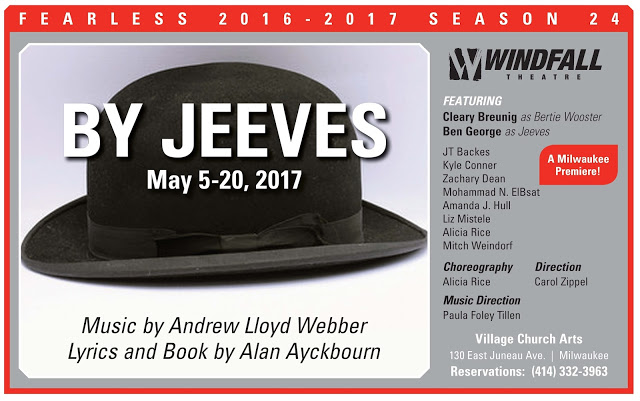
For the past 24 years, Windfall Theater has lived up to its tagline of presenting “fearless” theater. It is known for producing seldom-seen plays and musicals. Some of the latter include Anyone Can Whistle, The Last Five Years, and Celebration (coming in 2018). Windfall’s staff create these elaborate musicals with very little in the way of sets or props. (Somewhat more money usually goes into costumes.) Casts are large to the point where they almost comprise about one-third of audience members. And tickets are only $20. Windfall’s current “oddball” musical is By Jeeves, which is primarily known as Andrew Lloyd-Webber’s only complete flop. First produced in 1975, the musical was called simply Jeeves. When it was later rewritten, the show was given the expanded title, By Jeeves. It had a modest Broadway run in 2001. Consider how ironic this is for a composer who currently has four shows on Broadway at once: Phantom of the Opera, School of Rock, Sunset Boulevard, and Cats. By Jeeves recreates some well-loved characters from the stories of English author P.G. Wodehouse. At face value, one would think its appeal to audiences would outshine some other things which turn into Broadway musicals (the story of Alexander Hamilton’s life as told in hip-hop and rap music comes to mind). In any case, the Windfall Theater cast launches into a “fearless” production of that demonstrates why this show was a flop. Written and composed by the team of Alan Ayckbourn and Andrew Lloyd Webber, By Jeeves showcases two of Wodehouse’s most famous characters. One of them is Jeeves, a valet to the other character, the wealthy, thick-headed playboy Bertie Wooster. Throughout the production, Jeeves seems to have his hands full by continually getting the none-too-bright Bertie out of a jam.
The setting is a London flat and then a well-appointed English country estate. The show-within-a-show concept begins immediately, as the audience is addressed directly by Bertie. We (the audience) are waiting to hear him demonstrate his banjo-playing skill at a charity function. However, at the last minute, Bertie’s banjo is stolen. A replacement is expected to arrive in two hours. Jeeves suggests that Bertie entertain the audience with a few amusing anecdotes. “For TWO HOURS?”, gasps actor Cleary Breunig, who plays Bertie. Jeeves offers to help recruit some of Bertie’s friends to play some parts in the performance. Some of these would-be actors are better than others, as is typical in Windfall productions. The uneven casting doesn’t detract (much) from the show’s overall effect. The trouble here is that Bertie seems to have a tough time retaining his single status, as former fiancées and girlfriends seem to stick to him like glue. He keeps repeating this scenario over and over.
In the second act, a trio of men (Bertie, joined by friends J.T. Backes as Bingo and Kyle Conner as Gussie) sing a tribute to the ever-resourceful Jeeves. Under Jeeves’s direction, they sing, anything can be made right. Songs are accompanied nicely by a piano and guitar duo. A few of the songs are merely silly, while others can be heard as early themes that will reappear in future Lloyd Webber shows. For instance, “Half a Moment,” a lovely duet, contains strong traces of the melodies that will reappear in Phantom. The plot is so ridiculously contrived that it isn’t worth repeating. One of Wodehouse’s trademarks here is to reduce formal, aristocratic names to ghastly informal ones. Hence, characters are greeted by Bertie as “Crunchy,” “Stiffy” and “Stinker.” Wodehouse never failed to tweak the noses of the upper classes, and this is one of many examples. Some of the more impressive performances are given by Alicia Rice, who is also the show’s choreographer; Liz Mistele, whose real age makes it unrealistic for her to pull off a 22-year-old debutante; and Kyle Conner, her tongue-tied sweetheart. Special mention must be made of Mohammad N. ElBsat’s performance as Cyrus, a visiting American and potential rival for Madeline’s affection. Although it’s clear that Cyrus is from America, the “stand-in actor” who portrays him can’t seem to hold onto an accent for more than three lines. So, we are hilariously entertained by an accent that ranges between former TV character “Roseanne Rosana Dana,” a Brooklyn cop, an Italian and the drawl of a Southern cotton farmer. Director Carol Zippel, who successfully weaves together all this craziness, manages to produce some fine production numbers, too, including one that dresses its “dancers” in maid’s costumes and gardener’s outfits. The finale, a mixed-up tune called “Banjo Boy,” delivers an extra dose of visual gags that must be seen to be believed. If all this nonsense doesn’t sound like it’s worth your time and money, no matter. The small theater is guaranteed to be filled every night with musical comedy fans who can’t wait to see what unfolds in a rarely produced show that is memorable for all the wrong reasons.
